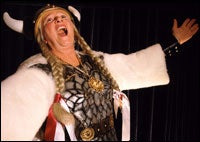

Although just coming into their own, they follow in the footsteps of singers who have mattered most - in particular, Paul Robeson, Marian Anderson, Maria Callas, Lorraine Hunt Lieberson and Jessye Norman. They are the two most must-hear singers before the public today.

They are members of the radical, “discipline-colliding” opera collective AMOC (American Modern Opera Company).

Both have been mentored by Peter Sellars, who has created exceptional projects for them. They are singers who have worked together many times. It has been increasingly evident that Bullock and Tines are the two singers who can most promisingly bring something powerful, meaningful and even existential to opera.ĭuring the pandemic, both have had a presence online, using the closure of concert halls to search into their roots and their very beings. But the differences as experiences weren’t big. Tines had the sacred space of a famed old L.A. This was a solemn, spiritual new music event presented by the Monday Evening Concerts, which has just announced Tines as the long-standing series’ first artist-in-residence.Īt the Bowl, the audience picnicked and Bullock was blown up on the big screens aside the famed shell. The progress over 50 minutes was from death to life, from dark to light, from heavy to light. With new meditative solo settings of the traditional Latin Mass written for the project by Caroline Shaw, Tines wove Bach, Bonds, Julius Eastman, the percussionist-composer Tyshawn Sorey and spirituals into a newly ordered Kyrie, Agnus Dei, Credo, Gloria, Sanctus and Benedictus. Queering meant the broadest sense of expansion, be it reflection of sexual orientation, of African American tradition or of our relevant present-day spiritual concerns. Tines, on the other hand, crafted his “MASS” recital, with pianist Adam Nielsen, as what the singer called a “queering” of the conventional mass. Elsewhere the program included such popular Gershwin favorites as Robert Russell Bennett’s arrangement of excerpts from “Porgy and Bess” in a “Symphonic Picture” and Variations on “I Got Rhythm” for piano and orchestra that got canceled when the soloist Aaron Diehl had to leave the stage shortly after beginning because he didn’t feel well. Bullock’s contribution was but five Gershwin and Bonds songs. Bullock was but part of a program of music by Gershwin and three neglected Black American composers - Bonds, Ulysses Kay and William Grant Still - conducted by Thomas Wilkins.

In one sense little might seem comparable between Bullock at the Bowl and Tines at First Congregational. The first of the song’s two stanzas ends, “Death has found her sweet.” Tines wavered on “sweet,” taking all the sugar out of it, ounce by profoundly moving ounce. 1: MASS” at First Congregational Church of Los Angeles. Then this Wednesday, the bass-baritone Davóne Tines included Bonds’ 1925 song “A Brown Girl Dead” in his “Recital No. She dove down into the darkest, most mysterious depths of an ocean-deep soul. In her delivery, she went deeper than mere rivers. She delivered a Langston Hughes line, “My soul has grown deep like the rivers,” and it’s not enough to say she sang the soulful song with soul. Soprano Julia Bullock included composer Margaret Bonds’ 1942 song “The Negro Speaks of Rivers” in her appearance last week with the Los Angeles Philharmonic at the Hollywood Bowl.


 0 kommentar(er)
0 kommentar(er)
